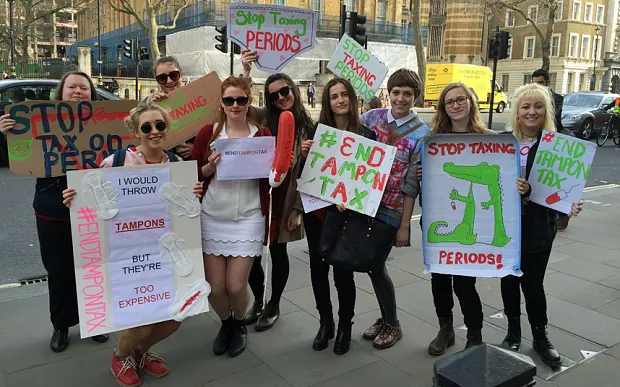Quyết định này theo lời của Bộ trưởng Ngân khố Australia Josh Frydenberg là một bước tiến cho thấy nỗ lực từ chính phủ mới để giành được sự ủng hộ từ cử tri nữ trước khi diễn ra bầu cử vào tháng Năm năm 2019.

Phụ nữ biểu tình phản đối đánh thuế VAT cho tampon ở Downing Street. Nguồn: The Telegraph
Các sản phẩm như bao cao su, kem chống nắng lại nằm trong danh mục miễn mức thuế hàng hóa và dịch vụ 10% trong suốt gần 20 năm qua, trong khi các sản phẩm vệ sinh phụ nữ không được miễn.
Frydenberg nói rằng việc dỡ bỏ này sẽ bắt đầu từ 1/1/2019. Bộ trưởng phụ trách phụ nữ Kelly O’Dwyer bày tỏ sự vui mừng khi mức thuế không công bằng này được dỡ bỏ, “hàng triệu phụ nữ Australia sẽ hưởng lợi từ quyết định này.”
Canada đã ngưng một loại thuế tương tự hồi năm 2015 sau khi có một bản kiến nghị của hơn 70.000 người, còn Anh sẽ loại bỏ đánh thuế sản phẩm băng vệ sinh tampon vào năm 2022.
Theo phân tích của giáo sư Peter Chen của Đại học Sydney, đây là một hành động không thể tránh trong thời đại của phong trào #MeToo, khi chính phủ đương nhiệm đang gặp vấn đề với cử tri nữ.
Việc dỡ bỏ mức thuế không được đồng tình này sẽ hoàn tất trước khi diễn ra bầu cử 4 tháng.
Các cuộc thăm dò ý kiến chỉ ra rằng chính phủ đang chạy đua để tránh thất bại, khi các cử tri tức giận về việc cựu Thủ tướng Malcolm Turnbull phải từ chức vì một vụ “đảo chính” trong nội bộ Đảng cầm quyền hồi tháng Tám.
Tân Thủ tướng Scott Morrison đã nổi lên như một ứng viên thỏa hiệp sau vụ việc Turnbull.
Cuộc thăm dò ý kiến mới nhất cho thấy chính phủ cầm quyền đang có đối thủ chính là Đảng Lao động với tỷ lệ 54% - 46% theo hệ thống bầu cử ưu đãi của Australia.
***
Australia scraps tampon tax as new PM seeks to woo female voters
SYDNEY (Reuters) - Australia will remove a controversial sales tax on women's sanitary products, Treasurer Josh Frydenberg said on Wednesday, a move widely seen as an effort by the center-right government to win favor with female voters before an election due by May.
Products such as condoms and sunscreen are exempt from the 10 percent goods and services tax that has been added to all other items sold in Australia for almost 20 years, including female sanitary products.
Frydenberg said the tax would be removed from Jan. 1, 2019, after the approval of Australian state and territory lawmakers was secured.
"We're really delighted that everyone's come on board to scrap what is an unfair tax," Kelly O'Dwyer, minister for women, told reporters in Melbourne.
"Millions of Australian women will benefit as a result."
Canada dumped a similar tax in 2015 after a petition was signed by more than 70,000 people, while Britain will scrap its equivalent tax on tampons from 2022.
"The government has a problem with female voters, particularly centrists who have been turned off by some of its rhetoric," said Peter Chen, professor of political science at the University of Sydney.
"In the era of #MeToo, it is a move that was a inevitable," he said.
The politically unpopular tax will cease in Australia four months before the next election is due. Opinion polls indicate the government is on course for a heavy defeat, with voters angry about the ousting of former prime minister Malcolm Turnbull in a party-room coup in August.
New Prime Minister Scott Morrison emerged as a compromise candidate after a challenge to Turnbull was launched by the right wing of the Liberal party, the senior partner in the Liberal-National coalition. A recent opinion poll showed the government was trailing the main opposition Labor party by 54 percent to 46 percent on a two-party preferred basis under Australia's preferential voting system, where votes from minor parties are redistributed.
